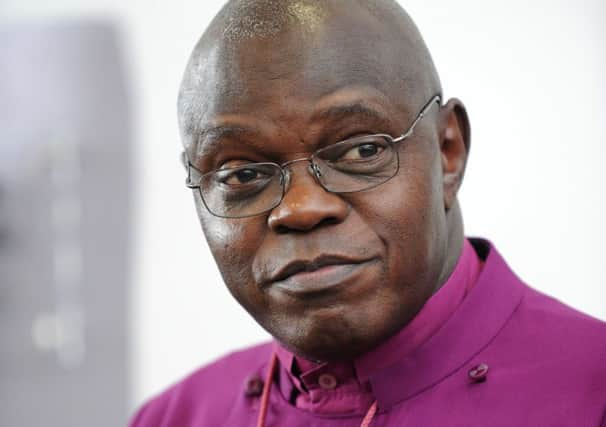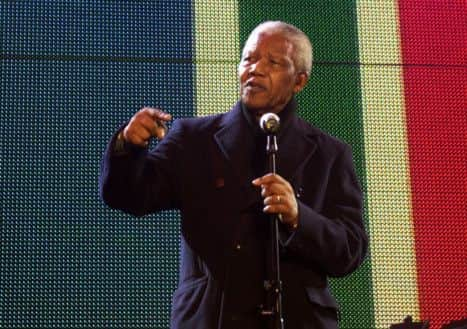John Sentamu: Symbol of hope and beacon of reconciliation


But Mandela was more than a man. He was a symbol of hope, an icon for fairness and a beacon for reconciliation – his legacy will continue in our global village long after his body has been laid to rest.
We are all familiar with the story of Nelson Mandela, but his heroism is both remarkable and often understated.
Advertisement
Hide AdAdvertisement
Hide AdA regime of racial segregation had been entrenched in South Africa since 1948. Successive national governments refused to recognise the rights of black people because of the colour of their skin; or to listen to their views. Faced with the injust of a system which deliberately frustrated, opposed and oppressed black people at every turn – Nelson Mandela stood up for the oppressed and helped give a voice to the voiceless.


In 1962, he was arrested and put in prison in Robben Island which is now a site of pilgrimage. He then served the rest of his sentence at Pollsmoor Prison and Victor Verster Prison. He remained in those institutions, hidden from public view for 27 years. But his resolve never wavered. In fact, the personal injustice he suffered helped to galvanise support both inside and outside the country.
When he was eventually released from his incarceration in 1990, this great fighter for freedom used his liberty to work for peace and forgiveness throughout the nation and the wider world.
Mandela knew in the darkest times that God had not forsaken or forgotten him – even though he knew it was, in part, his Christian faith and vision that had seen him put in prison. His belief in truth and justice for all was seen as both empowering to the masses and deeply dangerous for the same reason.
Advertisement
Hide AdAdvertisement
Hide AdWhen faced with injustice, there is no better place to begin your journey than in the counter cultural teachings of Jesus Christ. God calls for us to lead a radical lifestyle that puts the needs of others first.
I truly believe that Nelson Mandela’s legacy, and that of his compatriot Archbishop Desmond Tutu, will be right up there with Martin Luther King when we look at people who transformed global politics for the better in the 20th century.
Their individual struggles for human rights for all, has been recognised in the award of Nobel Peace Prizes and other great earthly honours. But their legacy is better judged in the faces of those families in South Africa or Southern America who were finally given the opportunity able to realise their dreams and aspirations.
Nelson Mandela, Archbishop Desmond Tutu and Martin Luther King each knew that to change the world began not with what you can get for yourself, but how you change the world for your brother or sister. When you can look at a person and see they are truly your brother or sister, then you know God is at work.
Advertisement
Hide AdAdvertisement
Hide AdThese pioneers knew that, with a level playing field, the leaders of tomorrow could come from the poorest communities that had been ignored and side-lined from the democratic process. For justice to prevail the world had to be turned on its head.
Making the world a better place means not joining a gang, but starting your own. Whether it be King with the Southern Christian Leadership Conference or Mandela and Tutu with the African National Congress, these men knew that road ahead though difficult was a road worth travelling.
Mandela was arrested and detained not for crimes against others, but for standing up for others. He turned the other cheek when he could have delivered swift retribution – he realised that two wrongs do not make a right, they only compound an injustice.
In 1994, preaching a message of hope and unity, Nelson Mandela led the ANC to a landslide victory in the first fully representative, multi-racial election in South Africa. He became the first black President of what had always been a predominantly black country.
Advertisement
Hide AdAdvertisement
Hide AdEven when given the reins of power and an unquestionable electoral mandate, Mandela refused to indulge in vengeance. He realised that although the past could never be forgotten, old injustices must be put to one side if a new more hopeful future was ever to be realised.
The greater good of a nation depended on magnanimity, generosity, hope and trust. Mandela led the nation to freedom.
Mandela’s government focused on dismantling the legacy of apartheid through tackling institutionalised racism, poverty and inequality, and fostering racial reconciliation. All were welcome to the table, whether black or white, male or female.
While Christians can in no way claim to have a monopoly in the field of social justice, we can always point to individuals like Nelson Mandela whose personal contribution has been immense.
Advertisement
Hide AdAdvertisement
Hide AdIn his autobiography, Long Walk to Freedom, Mandela himself said: “The Church was as concerned with this world as the next: I saw that virtually all of the achievements of Africans seemed to have come about through the missionary work of the church.”
Total transformation means the changing of lives so that the maladies that cause division are eliminated. Total transformation based on renewal was the vision of Archbishop Desmond Tutu’s restorative justice in the South African context. And it was reflected in Nelson Mandela’s encouragement of black people to focus their rage into acts of reconciliation.
As a society, and indeed as a world, we are bound together, and one of the hardest things to do is to deliver restorative justice to the perpetrator and at the same time stand side by side with the victims.
We should all follow the example that Nelson Mandela has set us. We should put God first, our neighbour second and ourselves last.
Advertisement
Hide AdAdvertisement
Hide AdLove is patient, love is kind – it does not envy, it does not boast, it is not proud, it is slow to anger. We should recognise the needs of others first, forever seeking justice and fairness, and put personal hurts and anger behind us.
Nelson Mandela was a man who stood up for lasting justice while suffering great personal injustice. He was a man who defeated unfairness with hope.
He was a man who knew that he was sending South Africa on a journey of discovery and interdependence that would last for generations to come – well beyond his own time.
As we remember Nelson Mandela, let us also remember the encouragement he gave everyone to be the people they were created to be.
Advertisement
Hide AdAdvertisement
Hide AdAs he once said: “Our deepest fear is not that we are inadequate. Our deepest fear is that we are powerful beyond measure. It’s our light, not our darkness, that most frightens us. We ask ourselves, “Who am I to be brilliant, gorgeous, talented, fabulous? Actually, who are you not to be? You are a child of God. We were born to make manifest the glory of God that is within us. It’s not just in some of us; it’s in everyone. And as we let our light shine, we unconsciously give other people permission to do the same. As we’re liberated from our own fear, our presence automatically liberates others.”
• Dr John Sentamu is the Archbishop of York.